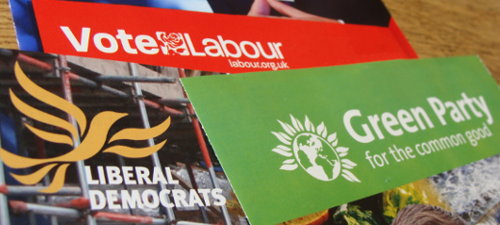 |
| Macron's landslide was not quite what it appeared, exposing how neoliberal Centrism depends upon disinterest and abstention. Photograph: Emmanuel Macron campaign poster 'Macron President' in Paris by Lorie Shaull (License) (Cropped) |
Nearly three-quarters of a year has passed since Emmanuel Macron took up the post of President of France. In that time he has seemingly managed to consolidate power (despite of some rocky moments). So: job done, new centrist model ready to roll out? Not so fast.
Well, let's look beneath the surface. The election landslides for Macron and La Republique En Marche were always going to provoke a response, especially with the near wipeout of the old centre-left Parti Socialiste (PS).
One small, but significant, reaction - an indication of how sizeable a reorganisation of French politics Macron has caused - is the reunification of the old Parti Radical with the breakaway Radical Party of the Left, as the new Mouvement Radical.
For years, the two radical parties - in former times a powerful party of government - were occasionally a crucial coalition partner of the larger parties. But they split from one another down the old left-right lines.
The Radical Party of the Left would partner with the Parti Socialiste and the centre-left, and the Radical Party would partner with the various centre-right parties. It appears that Emmanuel Macron has helped to settle the dispute between the two.
The reunification of the Radicals is a small thing, but also suggests that Macron's victory (and the collapse of PS) was big enough to put into abeyance the question of whether to partner with left or right. The radicals are happy with the centre.
That perhaps also says a lot about where Les Marcheurs lie on a political spectrum: European Federalist, social liberal, and for equality of opportunity (rather than of outcomes) within a free market.
Those were also the bones of Macron's pitch at the election. An election that left Macron with a severely weakened opposition, a a left-wing reduced to around 50-60 social liberals, social democrats and socialists, and a right-wing of around 130-140.
One potential problem Macron faced was if those with divided loyalties between En Marche and the social liberals and social democrats in opposition organise, Macron might face difficulty from a voting-bloc under his own left-wing.
However, the Left is still in disarray - and the Radicals seem set jump ship. The election was a disaster for the Parti Socialiste, it's bastion, who fell from 280 seats to just 30. Even their 2017 Presidential candidate Benoit Hamon has walked away.
Hamon has formed a new party, Generation.s, which has formed a tentative European alliance with Yanis Varoufakis and DiEM25. It had been hoped that Hamon might do for PS what Corbyn did for Labour in Britain, but now he will have to start from scratch.
There are also two separate far-left groups in the National Assembly, that have yet to find a way to work together - France Insoumise with 17 seats and Gauche Democrate et Republicaine with 16 seats.
With the collapse of the Left and, so far, no sign of a new rallying position, Macron has for the moment usurped the place of the Parti Socialiste in two-party system. Does this mean that the centre is saved and the model can be copy and pasted elsewhere?
No.
The hope for a centrist revival is not giving due credit the particular circumstances of Macron's victory - nor that both Macron and Les Marcheurs won, across the board, as the least worst option amidst raging disinterest. Not exactly an inspiring rallying call.
Macron's victory also has shadows of the upswell that took Barack Obama to the US Presidency in 2008. Macron, undeniably a member of the party establishment, rode on the back of a movement that was then jettisoned when office was achieved.
The leading talents of that movement were absorbed into the government machinery, while the movement itself has been left without it's leading figures and central purpose. Will it survive or find a new role?
That Macron has succeeded in consolidating his position must still be put to the test at the ballot. As Obama learned, when you set high expectations, the movement will want practical changes it can touch. A legacy they can touch.
What Macron has right now is a governing majority. He doesn't even have a campaign machinery for himself or his supporters to sustain their agenda. Nothing has really changed over the past year.
Copy the En Marche model at peril. Macron's was a victory for charismatic leadership, but it's hollow inside. The future, never mind success, will depend on the support existing parties like MoDem and the Radicals, and the creation of some sort of plain, traditional electoral machinery for Les Marcheurs.
Macron's victory was a lesson in how to get into government, not in how to stay there. He made waves, a tidal wave, that upset the system and forced some realignment. But politics is fickle.
Alliances can seem unbreakable, until they aren't. Break ups are forever, until they aren't. Just ask the Radicals.












